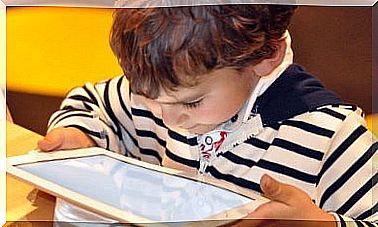Children Who Speak To Themselves: Is It Something Positive Or Negative?

It is often said that children who speak to themselves suffer from some kind of disorder, are upset or something happens to them. However, the reality is different, since they are not only well in the head, but also have an excellent connection between intelligence and what is known as private speech.
According to studies carried out by expert doctors, such as the psychiatrist Luis Rojas Marcos, talking to oneself and out loud helps to make thoughts more precise and accurate. You think better.
Likewise, the decisions that are made are more effective, the thoughts are organized in a more coordinated way and even represent an important support for personal improvement.
The bottom line is that if your child talks to himself, let him do what he does. It means that he is too smart.
Why is it good for children who speak to themselves to speak out loud?
Many are the parents who during the development of their children have seen that they play and, while they do so, they talk to themselves. This can happen even with adults. Many are used to talking while doing their work. It definitely means that they are very intelligent people.
The child should never be reprimanded in such circumstances. These soliloquies go a long way towards improving their language and also controlling their behavior. Hence, they acquire excellent skills.

If we observe our children carefully, we will realize that they speak more alone than if they were accompanied. These monologues in 10-year-old children represent between 20% and 60% of their interaction.
On the other hand, some experts see this situation as a development of the cognitive part of all children. If we see this model as an integral part of child development, all those involved in teaching should contribute to promoting it in healthy children and implementing it in children with mental disorders.
Situations presented in children who speak to themselves
There are three very common situations in which children who speak to themselves often do so. These are:
- Before starting to do something.
- When they are doing something.
- After you have finished doing something.
These situations are like a kind of preliminary analysis that the child makes, as a way of planning a game. If you are playing games or doing homework, you can do that too. This is good for his mental health, as it not only keeps his neurons active, but it keeps him entertained on things that are important to him.
Benefits of speaking alone
- Children who talk are only stimulating themselves. He learns to solve situations that will be of great help to him in the future.
- Talking will only lead you to be a more communicative person.
- When a child is playing and talking to himself, his language will develop in a more stimulating way.

- The child will learn to differentiate the things that surround it in the environment where it is deployed.
- Your mind begins to order logically and with good sense.
- When you are playing and talking to yourself, it means that all your thoughts are organizing to achieve a proposed end.
- By saying out loud everything you set out to do, you will improve your language skills and at the same time stimulate your ability to learn.
- By speaking only when playing, the child is promoting his knowledge through his own voice. This way, you will get to know yourself better.
That is why, when we observe children talking to themselves and they are doing a task, we can conclude that they are looking for a solution to a problem. This also serves as a support tool for them to achieve a solution that may be complex for them.
Conclusions
In conclusion, many researchers have stated that there is a relationship between intelligence and the quantity and quality of speech. This indicates that the more intelligent the child is, the more he will have resorted to it and, therefore, its content is more mature.
Children who speak to themselves have the opportunity to tell fantasies, converse with an imaginary friend, and even with objects that do not really exist. This is how they tell each other their dreams. Speaking alone, then, is considered an instrument for the development of self-control and thinking.










